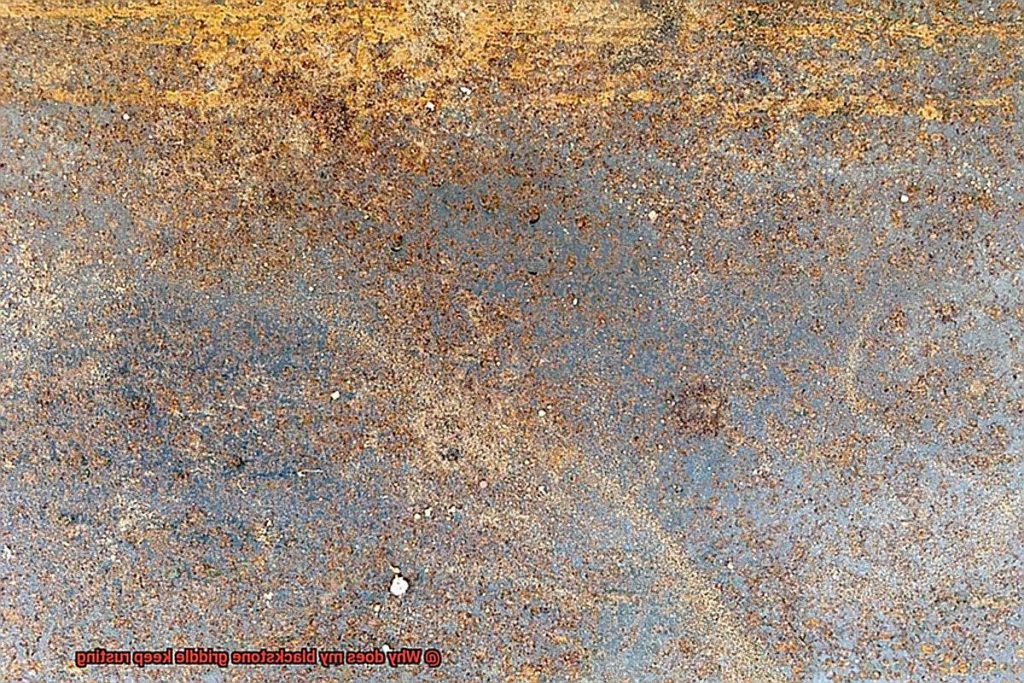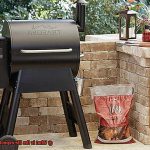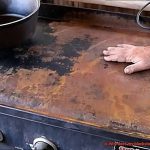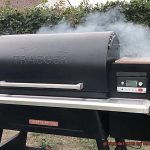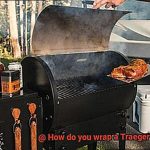Imagine this: it’s a gorgeous day outside, and you’re all set to throw an epic backyard BBQ. You stroll out to your trusty blackstone griddle, only to be greeted by the unsightly sight of rust. Not only is rust an eyesore, but it can also pose a health hazard if ingested. You scrub and scour, but no matter what you do, the rust keeps creeping back.
If you’ve been grappling with this frustrating issue, fear not – you’re not alone. Many blackstone griddle owners have faced the same conundrum and are left wondering why their prized possession just won’t stop rusting. The answer lies in a combination of factors, including the materials used to make the griddle, the environment it’s exposed to, and how well it’s maintained.
In this blog post, we’ll take a closer look at why your blackstone griddle keeps rusting and explore some possible solutions. We’ll delve into the effects of moisture, heat, and oil on your griddle’s lifespan and examine whether stainless steel might be a better option for some grill masters.
Whether you’re new to blackstone griddles or have been using them for years, understanding what causes rust can help extend your equipment’s longevity. So let’s dive in and get to the root of why your blackstone griddle is constantly rusting.
Contents
The Blackstone Griddle and Its Prone to Rusting
The Blackstone griddle is a versatile outdoor cooking tool that allows you to cook a wide range of foods to perfection. However, one issue that many owners of this grill face is rusting. Rust spots on the surface not only ruin the appearance of your griddle, but they can also affect the taste of your food.
So, what causes rusting on the Blackstone griddle? One common culprit is moisture. The griddle’s surface is made of steel, which is prone to rusting when exposed to moisture. If you live in an area with high humidity or near the coast, the salt air can cause rusting. Leaving your griddle outside without protection can also expose it to rain and other forms of moisture, leading to rust formation over time.
To prevent rust on your Blackstone griddle, proper care and maintenance are essential. After each use, wipe down the surface with a dry cloth or paper towel to remove any excess oil or food residue. You can also season your griddle with oil to create a protective layer that prevents rust from forming.
Another factor that contributes to rust formation is exposure to acidic substances such as vinegar or lemon juice. These substances can react with the metal surface of the griddle and cause it to corrode over time. To avoid this, make sure to clean your griddle thoroughly after each use and avoid leaving food debris on the surface for extended periods.
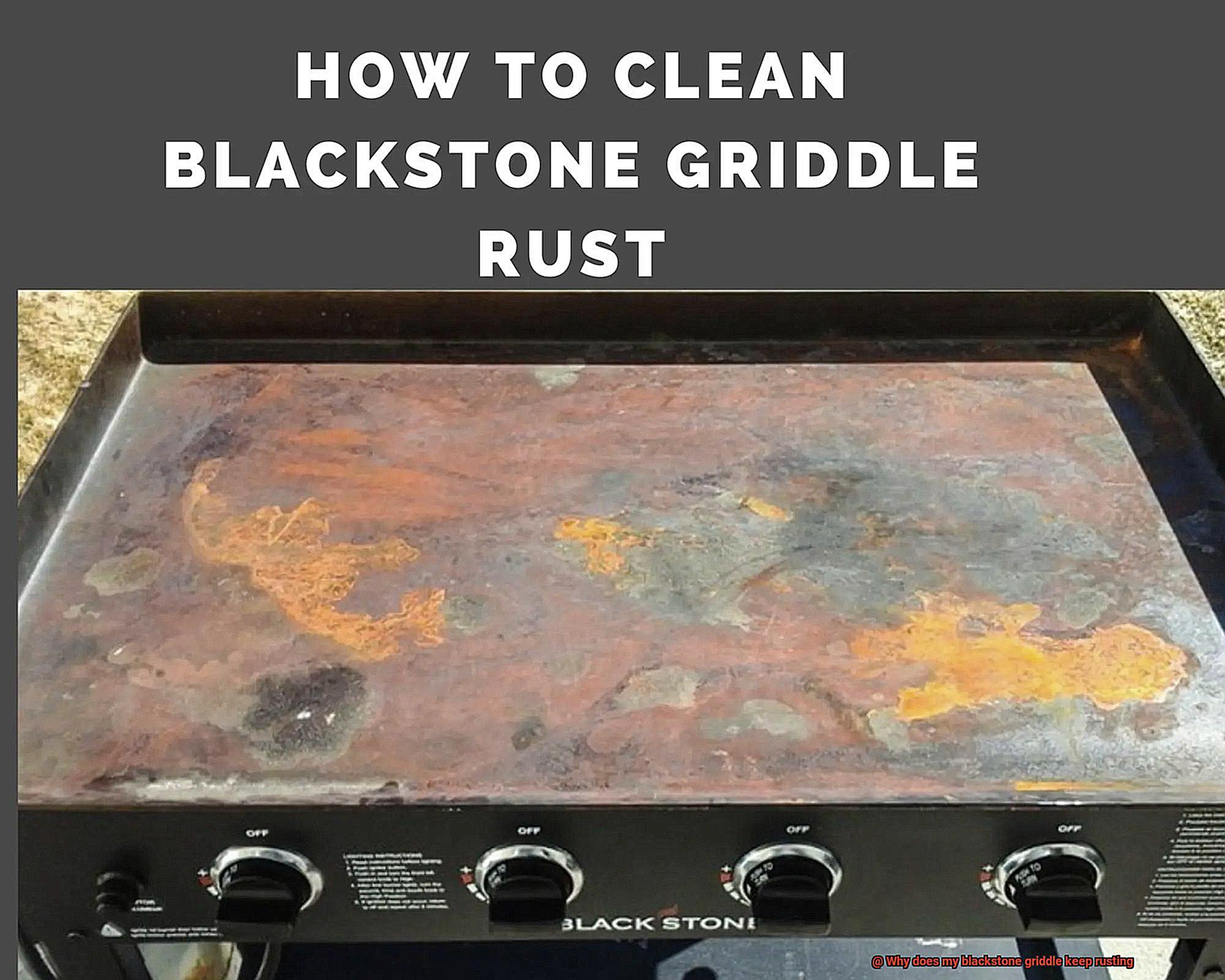
Investing in a high-quality cover for your Blackstone griddle is also crucial in preventing rusting. A cover creates a barrier between your griddle and the elements, preventing moisture and oxygen from coming into contact with the metal and causing rust. Additionally, applying a commercial rust inhibitor to your griddle’s surface can give an extra layer of protection.
In summary, taking care of your Blackstone griddle is crucial in preventing rust formation and ensuring its longevity. Here are some tips to keep in mind:
- Wipe down the surface with a dry cloth or paper towel after each use.
- Season your griddle with oil to create a protective layer.
- Clean your griddle thoroughly and avoid leaving food debris on the surface for extended periods.
- Invest in a high-quality cover to protect your griddle from the elements.
- Apply a commercial rust inhibitor for added protection.
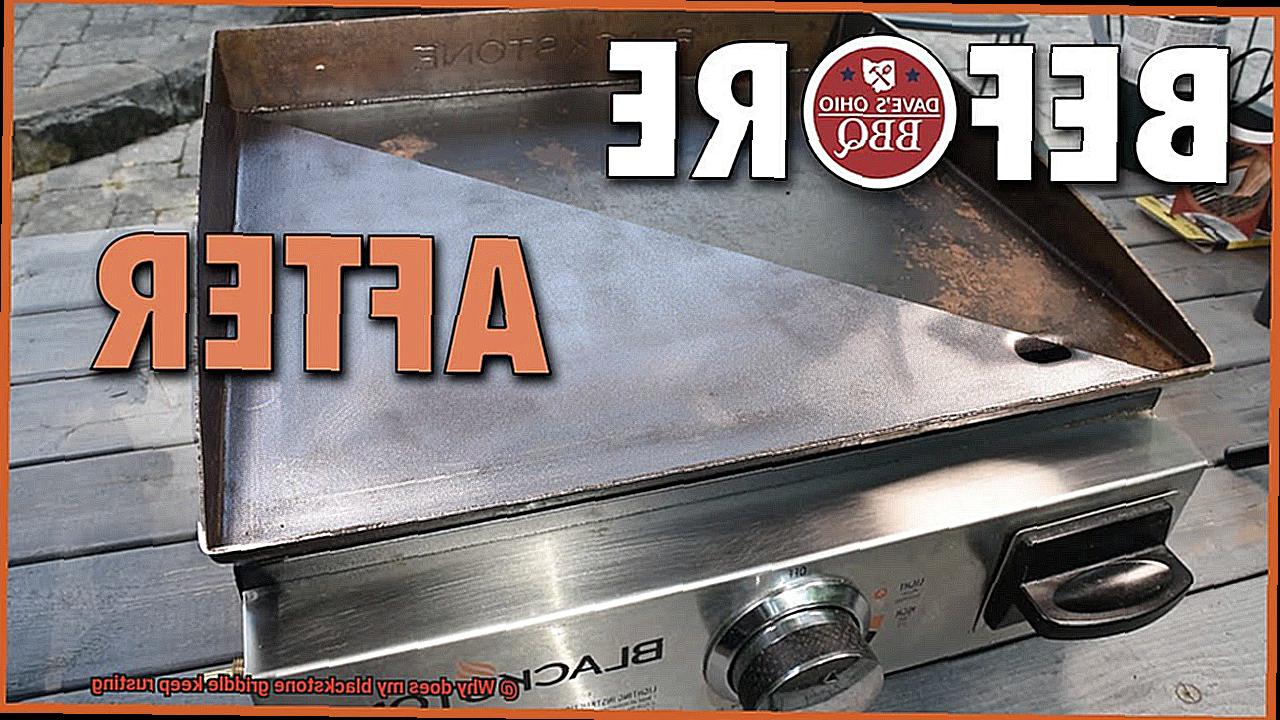
Common Causes of Rust on a Blackstone Griddle
As much as we love our trusty cooking companion, rust formation can be a real buzzkill. Rusty griddles not only make cooking a nightmare, but they can also compromise your health. Therefore, it’s crucial to understand the common causes of rust on a Blackstone griddle to take better care of it.
First and foremost, exposure to moisture is the primary culprit behind rust formation on your Blackstone griddle. When water or any other liquids come in contact with the metal surface of your griddle, it can cause rust to form. Hence, always keep your griddle dry and clean. After cooking, wipe off any excess moisture or food particles from the surface of the griddle to prevent rust formation.
The second reason for rust formation is lack of seasoning. Seasoning your Blackstone griddle is more than just flavoring your food; it also helps protect the metal surface from rusting. A seasoned griddle forms a protective layer of polymerized oil that prevents moisture and air from reaching the metal surface. Neglecting to season your griddle regularly or not doing it properly can leave the metal surface vulnerable to rust.
The third reason for rust formation is exposure to salt. Salt can corrode and damage the metal surface of your griddle, leading to rust formation. If you live in an area with high humidity or near the ocean where saltwater can be present in the air, you need to take extra care in maintaining your griddle by cleaning it thoroughly after every use.
Lastly, improper storage can also contribute to rust formation on your Blackstone griddle. Leaving your griddle outside or in a damp area without proper cover or protection exposes it to moisture and other elements that can cause rust to form. So, store your griddle in a dry and clean area, preferably indoors or in a covered outdoor space.
Preventing Rust on a Blackstone Griddle
Keeping your griddle rust-free will ensure its longevity and allow you to enjoy your cooking experience to the fullest. Here are some tips on how to prevent rust from forming on your Blackstone griddle.
Firstly, cleanliness is key. After each use, wipe down the griddle surface with a damp cloth or paper towel to remove any leftover food particles or grease. Then, apply a thin layer of oil to the surface to prevent moisture from accumulating and causing rust. This quick and easy step can go a long way towards keeping your griddle rust-free.
Secondly, proper storage is just as important. Store your griddle in a dry and cool place, away from any moisture or humidity. When not in use, cover it with a protective cover to prevent any water droplets or humidity from settling on the surface and causing rust.
Thirdly, seasoning your griddle is a must-do step that can also help prevent rust formation. Seasoning involves applying a layer of oil onto the surface of the griddle and heating it up until the oil forms a protective layer over the metal surface. Not only does this layer of seasoning help prevent moisture from accumulating, but it also adds an extra layer of flavor to your food.
Finally, if you notice any signs of rust forming on your griddle, don’t hesitate to take action immediately. Use a wire brush or steel wool to remove any visible rust spots and then apply a thin layer of oil to the affected area to prevent further rust formation.
Keeping the Griddle Clean and Dry
Here are some expert tips to help you maintain your griddle in tip-top condition.
Firstly, cleaning your griddle after each use is a must. Any remaining food or grease can attract moisture, which can lead to rust formation over time. To prevent this, let your griddle cool down before using a scraper or spatula to remove any food remnants. Then, wipe the surface with a paper towel or cloth.
But cleaning is just the beginning – it’s equally important to make sure that your griddle is completely dry before storing it. Leaving any moisture on the surface can create the perfect environment for rust to develop. To avoid this, use a dry cloth or let it air dry for a few minutes before storing it.
Next up is seasoning. Not only does seasoning add flavor to your cooking, but it also creates a protective layer on the surface of the griddle that helps prevent rust formation. To season your griddle, apply a thin layer of oil (such as vegetable or canola oil) and heat the griddle on high for 20-30 minutes. Repeat this process several times before using the griddle for cooking.
Finally, proper storage is key to preventing rust from forming on your griddle. If you’re storing it outside, make sure it’s covered with a waterproof cover to protect it from rain and moisture. If you’re storing it indoors, make sure it’s in a dry area away from any sources of moisture.
Investing in a Cover for Outdoor or Coastal Areas
Whether you’re cooking up a storm in your backyard or enjoy coastal views, investing in a cover for your outdoor or coastal areas is a smart move that will pay off in the long run.
Outdoor areas, especially those near the coast, are more prone to humidity and salty air, which can cause rust and corrosion on metal surfaces. A high-quality cover made of waterproof and UV-resistant material can help to shield your Blackstone griddle from rain, sun, and saltwater damage. When selecting a cover, look for one that fits snugly over your griddle and has tie-downs or straps to keep it secure even in strong winds.
It’s important to choose a cover that is specifically designed for your model and size of Blackstone griddle. An ill-fitting cover can cause more harm than good, leading to damage rather than protection. With the right fit, you’ll not only protect your investment but extend the life of your griddle.
Investing in a cover is also cost-effective. Rather than replacing the entire griddle due to rust and corrosion, replacing a worn-out cover is much cheaper. It’s a small investment that can save you money in the long run.
Finally, investing in a cover for your Blackstone griddle will ensure that you can continue to enjoy delicious grilled meals for years to come. By protecting your griddle from outdoor elements, you’ll keep it in top condition and prevent any potential damage.
Applying a Protective Coating to the Griddle
Have no fear. Applying a protective coating to your Blackstone griddle is like giving it a suit of armor, protecting it against the elements and ensuring it stays in tip-top shape for years to come.
To start, there are three types of protective coatings that you can use on your griddle – oil, seasoning, and paint. Let’s dive deeper into each one:
- Oil: If you’re looking for a quick and easy solution, oil is the way to go. This coating creates a barrier between the metal and air, preventing moisture from causing rust. Simply coat your griddle in a thin layer of cooking oil, such as vegetable or canola oil, and wipe off any excess before using the griddle.
- Seasoning: Another popular coating for Blackstone griddles is seasoning. This technique involves heating up the griddle and applying a layer of oil or fat to the surface. The heat causes the oil to polymerize, creating a hard, non-stick surface that protects against rust and other forms of corrosion. To season your griddle, make sure you clean it thoroughly with a scraper or grill brush first. Then, heat it up on high for at least 30 minutes before applying a thin layer of oil or fat to the surface. Let it cool completely before using.
- Paint: For a more permanent protective coating, consider painting your Blackstone griddle. There are special paints designed specifically for use on grills and outdoor cooking equipment that offer excellent protection against rust and other forms of corrosion. However, painting your griddle requires more prep work than using oil or seasoning. You will need to thoroughly clean and sand the surface of the griddle before applying the paint to ensure it adheres properly.
Understanding the Causes of Rust Formation
If so, it’s important to understand the various causes of rust formation so that you can take preventative measures.
One of the main causes of rust formation on blackstone griddles is exposure to moisture and oxygen. When iron comes into contact with water or air, it undergoes a chemical reaction known as oxidation, resulting in the formation of rust. This process is accelerated in environments with high humidity or salt content, such as coastal areas. Therefore, if you live in a coastal area or an area with high humidity, your blackstone griddle is more susceptible to rust formation.
However, improper cleaning and maintenance can also contribute to rust formation. If you fail to clean your blackstone griddle after every use or leave it wet for an extended period, moisture can accumulate and promote rust formation. To avoid this, make sure to properly clean and dry your griddle after each use.
Using abrasive cleaning products or tools can also scratch the surface of your griddle and make it more prone to rusting. Therefore, it’s recommended to use gentle cleaning products and tools that won’t damage the surface of your griddle.
Additionally, using acidic marinades or foods on your blackstone griddle can also contribute to rust formation. Acidic substances like tomatoes, vinegar, or citrus juices can corrode the surface of your griddle and create an environment conducive to rust formation. So be mindful of what you cook on your blackstone griddle and avoid using acidic substances if possible.
It’s worth noting that some blackstone griddles are made of stainless steel, which is resistant to rust formation. However, even stainless steel can corrode if exposed to harsh chemicals or high heat levels. Therefore, it’s important to use caution when cleaning your stainless steel griddle and avoid exposing it to harsh chemicals or high heat levels.
Taking Steps to Prevent Rust Formation
Maintaining the longevity and quality of your Blackstone griddle is crucial, and preventing rust formation is a significant part of this process. Rust forms when the metal surface of the griddle comes into contact with moisture and oxygen for extended periods, leading to the formation of iron oxide. However, you can take specific measures to prevent this from happening and keep your Blackstone griddle rust-free.
Firstly, ensure that your griddle is always clean and dry to prevent rust formation. After each use, wipe down the griddle with a dry cloth or paper towel to remove any food residue or liquids. If there are stubborn stains or burnt-on food, use a scraper or grill brush to remove them gently. Make sure to dry the surface entirely before storing it away.
Another crucial step in preventing rust is seasoning your Blackstone griddle regularly. Seasoning involves applying a layer of oil on the cooking surface that protects it from moisture and other elements that can cause rust. Heat up the griddle and apply a thin layer of oil using a paper towel or brush. Allow it to cool down completely before wiping off any excess oil.
Storing your Blackstone griddle in a dry place away from moisture and humidity is also vital in preventing rust formation. If you leave it outside, ensure that it is covered with a waterproof cover that will protect it from rain and other elements.
Additionally, using a rust inhibitor spray on your Blackstone griddle creates a protective layer on the metal surface, preventing moisture and oxygen from coming into contact with the metal. This spray can help prevent rust formation effectively.
NmaRPdiBve0″ >
Conclusion
In conclusion, rust on your Blackstone griddle can be a frustrating issue, but it is not uncommon. The root causes of rust formation on your griddle include exposure to moisture, lack of seasoning, exposure to salt, and improper storage. To prevent rust from forming, proper care and maintenance are essential.
To keep your Blackstone griddle in top condition, it’s important to understand the primary culprit behind rust formation – moisture and oxygen. However, improper cleaning and maintenance can also contribute to rust formation.
Thankfully, there are steps you can take to prevent rust from forming and extend the life of your griddle. This includes wiping down the surface after each use, seasoning the griddle regularly with oil or fat, storing it in a dry place away from moisture and humidity, investing in a high-quality cover for outdoor or coastal areas, and applying a protective coating such as oil or paint.
By following these tips and taking preventative measures against rust formation on your Blackstone griddle, you can ensure that you’ll be able to enjoy delicious grilled meals for years to come without having to deal with unsightly rust spots or health hazards caused by ingesting rusty particles.

